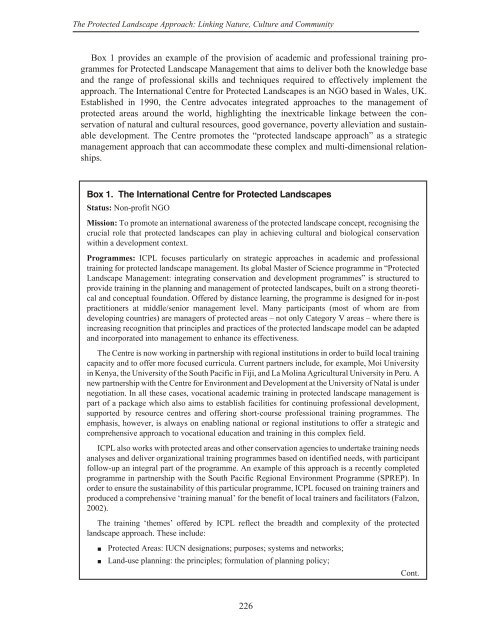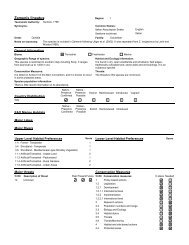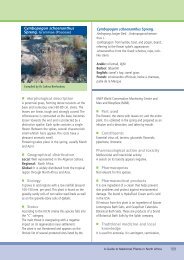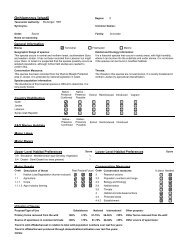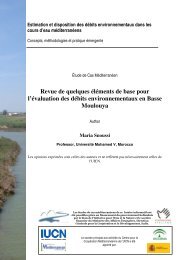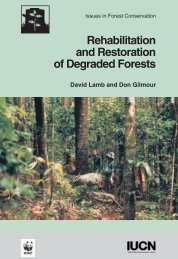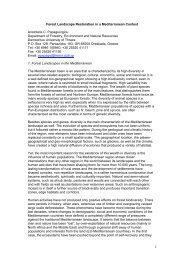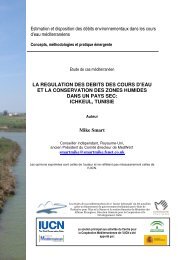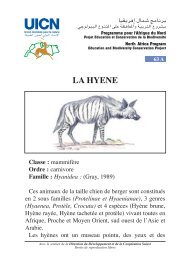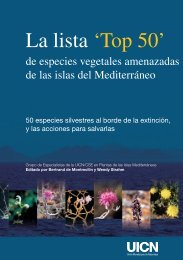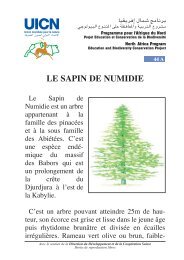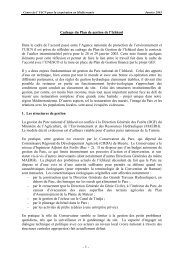The Protected Landscape Approach - Centre for Mediterranean ...
The Protected Landscape Approach - Centre for Mediterranean ...
The Protected Landscape Approach - Centre for Mediterranean ...
You also want an ePaper? Increase the reach of your titles
YUMPU automatically turns print PDFs into web optimized ePapers that Google loves.
<strong>The</strong> <strong>Protected</strong> <strong>Landscape</strong> <strong>Approach</strong>: Linking Nature, Culture and Community<br />
Box 1 provides an example of the provision of academic and professional training pro -<br />
grammes <strong>for</strong> <strong>Protected</strong> <strong>Landscape</strong> Management that aims to deliver both the knowledge base<br />
and the range of professional skills and techniques required to effectively implement the<br />
approach. <strong>The</strong> International <strong>Centre</strong> <strong>for</strong> <strong>Protected</strong> <strong>Landscape</strong>s is an NGO based in Wales, UK.<br />
Established in 1990, the <strong>Centre</strong> advocates integrated approaches to the management of<br />
protected areas around the world, highlighting the inextricable linkage between the con -<br />
servation of natural and cultural resources, good governance, poverty alleviation and sustain -<br />
able development. <strong>The</strong> <strong>Centre</strong> promotes the “protected landscape approach” as a strategic<br />
management approach that can accommodate these complex and multi-dimensional relation -<br />
ships.<br />
Box 1. <strong>The</strong> International <strong>Centre</strong> <strong>for</strong> <strong>Protected</strong> <strong>Landscape</strong>s<br />
Status: Non-profit NGO<br />
Mission: To promote an international awareness of the protected landscape concept, recognising the<br />
crucial role that protected landscapes can play in achieving cultural and biological conservation<br />
within a development context.<br />
Programmes: ICPL focuses particularly on strategic approaches in academic and professional<br />
training <strong>for</strong> protected landscape management. Its global Master of Science programme in “<strong>Protected</strong><br />
<strong>Landscape</strong> Management: integrating conservation and development programmes” is structured to<br />
provide training in the planning and management of protected landscapes, built on a strong theoreti -<br />
cal and conceptual foundation. Offered by distance learning, the programme is designed <strong>for</strong> in-post<br />
practitioners at middle/senior management level. Many participants (most of whom are from<br />
developing countries) are managers of protected areas – not only Category V areas – where there is<br />
increasing recognition that principles and practices of the protected landscape model can be adapted<br />
and incorporated into management to enhance its effectiveness.<br />
<strong>The</strong> <strong>Centre</strong> is now working in partnership with regional institutions in order to build local training<br />
capacity and to offer more focused curricula. Current partners include, <strong>for</strong> example, Moi University<br />
in Kenya, the University of the South Pacific in Fiji, and La Molina Agricultural University in Peru. A<br />
new partnership with the <strong>Centre</strong> <strong>for</strong> Environment and Development at the University of Natal is under<br />
negotiation. In all these cases, vocational academic training in protected landscape manage ment is<br />
part of a package which also aims to establish facilities <strong>for</strong> continuing professional development,<br />
supported by resource centres and offering short-course professional training pro grammes. <strong>The</strong><br />
emphasis, however, is always on enabling national or regional institutions to offer a strategic and<br />
comprehensive approach to vocational education and training in this complex field.<br />
ICPL also works with protected areas and other conservation agencies to undertake training needs<br />
analyses and deliver organizational training programmes based on identified needs, with participant<br />
follow-up an integral part of the programme. An example of this approach is a recently completed<br />
programme in partnership with the South Pacific Regional Environment Programme (SPREP). In<br />
order to ensure the sustainability of this particular programme, ICPL focused on training trainers and<br />
produced a comprehensive ‘training manual’ <strong>for</strong> the benefit of local trainers and facilitators (Falzon,<br />
2002).<br />
<strong>The</strong> training ‘themes’ offered by ICPL reflect the breadth and complexity of the protected<br />
landscape approach. <strong>The</strong>se include:<br />
<br />
<br />
<strong>Protected</strong> Areas: IUCN designations; purposes; systems and networks;<br />
Land-use planning: the principles; <strong>for</strong>mulation of planning policy;<br />
Cont.<br />
226


